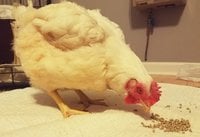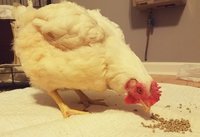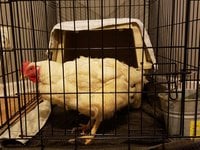Henrietta and friends
In the Brooder
Hi everyone! I'm very new to chickens and mine was injured pretty bad. Her wound is healing wonderfully and we have been keeping her inside while she heals. It will be a week tomorrow since she was hurt and her wound is scabbed over now. She is only an only chicken, explanation down below, and I'm wondering when she can go back outside and move back into her coop? She is antsy to get back outside and we would love to let her return to the yard again!
Thank you,
Ashley
Why she is an only chicken: Henrietta grew up in a chicken barn being raised for meat, when the truck came she escaped and found her way to my friends house. She called me and we caught her. The farmer was fine with me taking her so she joined our family. We have never had chickens before so before adding more chickens to our family, we wanted to have a proper coop built. The second day after her coop was built, she got injured. Since then she has been healing. The moment we can, we will be adding more chickens we just want her to be healed first.
Thank you,
Ashley
Why she is an only chicken: Henrietta grew up in a chicken barn being raised for meat, when the truck came she escaped and found her way to my friends house. She called me and we caught her. The farmer was fine with me taking her so she joined our family. We have never had chickens before so before adding more chickens to our family, we wanted to have a proper coop built. The second day after her coop was built, she got injured. Since then she has been healing. The moment we can, we will be adding more chickens we just want her to be healed first.








 . I say NatureWise because we have silkies and those dang things feathers are so hard to keep in line and so they constantly have feather fixer and we found best results in NatureWise than in any other brand. What was her injury and can i get pics of the injured spot now? depending on how much room you have i would recommend getting 3 more hens for her and make sure they are chicks because if you get chickens the same age or size as her they will fight were as chicks, when you them and they are old enough to go outside, wont fight with her and will immediately see her as top dog.
. I say NatureWise because we have silkies and those dang things feathers are so hard to keep in line and so they constantly have feather fixer and we found best results in NatureWise than in any other brand. What was her injury and can i get pics of the injured spot now? depending on how much room you have i would recommend getting 3 more hens for her and make sure they are chicks because if you get chickens the same age or size as her they will fight were as chicks, when you them and they are old enough to go outside, wont fight with her and will immediately see her as top dog.